Off-Topic: What does it mean when an RPG’s story is on rails — and is it a bad thing?
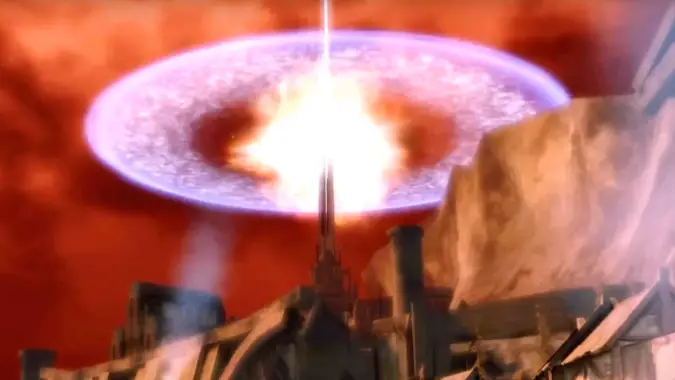
The other day I talked about my love for Dragon Age 2. When I wrote that post, I did admit that the game does have flaws. One of those flaws is that at times, the game can feel extremely linear, to the point where it doesn’t really matter what you do — specific bad things are going to happen, and even when the game presents you with options related to those bad things, they don’t ultimately matter.
From this point on, I’m going to talk spoilers for Dragon Age 2, as well as a few light spoilers for Assassin’s Creed: Odyssey and Dragon Age: Origins.
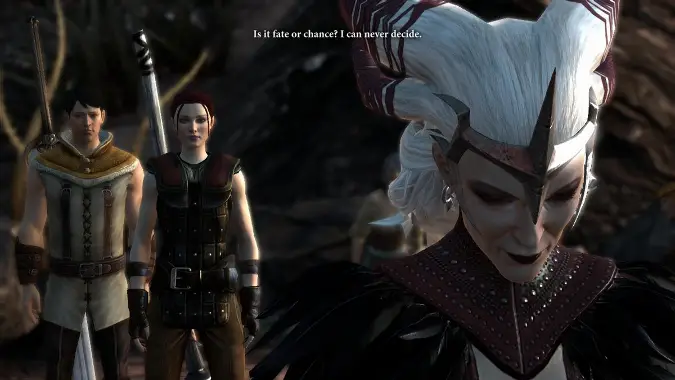
The narrative as a path
When you play Dragon Age 2 each Act has a big set piece pivotal moment. Act 1 sends you to the Deep Roads. If you bring your sibling with you, they contract the Blight — from there they can either die, or if you brought Anders, they can be recruited to the Grey Wardens. If you leave them behind in Kirkwall, they are either impressed into the Circle of Mages against their will, or they choose to join the Templars, the mage-controlling order of Knights that looks none too kindly on you as a renegade mage. Either way, that character is gone — you can do nothing to fundamentally affect this, but at least you can decide what path they take out of your life. This is what I consider a moderate on-rails decision, because while there is no choice about the affect it has on your game, there is a choice as to what the actual fate of your sibling is.
But Act 2? Act 2 has a moment that leads up to the big set piece, that is so crucial to that progression that it can’t be completed until you finish this quest, and there is literally nothing you can do to prevent the worst possible outcome. Upon returning home from investigating a series of grisly killings perpetrated by an unknown mage, you are presented with the news that your mother is missing. Investigating, you discover that she has also been taken by the same killer, and you rush forward to save her.
And you fail.
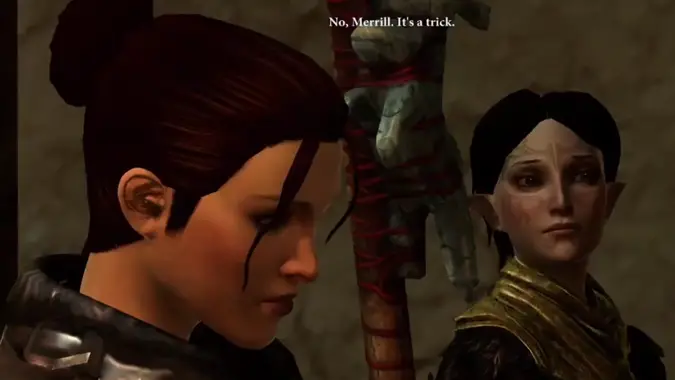
Failure isn’t the problem, lack of consequence is
Now, I’m not inherently opposed to failure in RPG’s. Sometimes in a story, bad things happen and you can’t succeed. What I’m opposed to is that the game presents you with a series of choices you could make — allow one of the suspects of the killings to live and escape vs. killing them, take the investigation seriously vs. treating it like a joke, jumping right on these quests vs. holding off and doing them later. It even lets you go find the suspect you spared and have them lead you to the mage in question who has your mother, completely skipping the whole part of the story where you track her through the streets of Kirkwall.
And none of this matters in the slightest. Nothing you do has any impact on the scenario. Skip the search phase and use blood magic to find your mother? It’s exactly the same as if you didn’t. Never mind getting there fast enough to save her from dying, you don’t change anything about the scene, except for the killer and the blood mage you used to get there having a make-up moment that you can interrupt by killing said blood mage. There’s literally no effect on the overall story no matter what decisions you made.
Now, compare this to Act 1. You can’t stop your sibling from being gone, but you can stop them from being dead, if you make the exact right decision, and you can even choose not to bring them at all which changes where they end up. There’s some agency there. In Act 2? Literally nothing you do is going to make even the slightest difference in your mother’s fate. You can’t save her from death, and you can’t even make it so her death is even slightly less horrible — you can’t interrupt the killer before he does what he set out to do in any way.
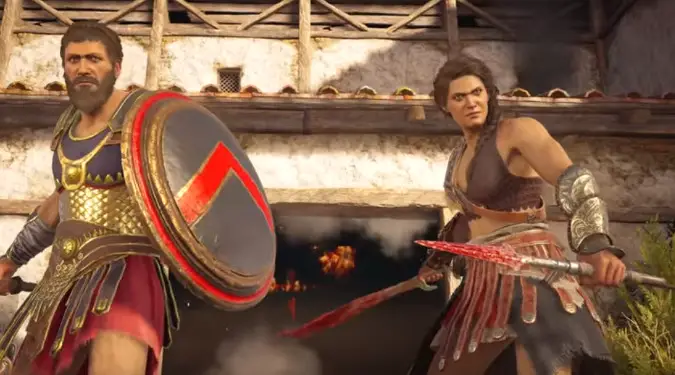
All games are railroads
While I’m using Dragon Age 2 here, this is hardly unique to that game — it’s heavily present in a lot of role playing games. The first Dragon Age has it — there are moments where you can make a choice and affect the game, absolutely, but no matter what you do, certain events (the deaths of the Couslands, the betrayal of King Cailan at Ostagar) will occur because they must occur. The game can’t exist without them. Even if you didn’t play a mage? Jowan still ends up a blood mage and flees, Uldred still sparks a rebellion in the tower. And yet, despite this? There are still moments where choices you’ve made matter, and have a big impact on the outcome. The Archdemon’s death is just one example.
Assassin’s Creed Odyssey is one of my favorite games of the past year, and one thing I love is that the ultimate fate of your Alexios’ or Kassandra’s family is wholly in your hands. You can make decisions, and those decisions will have consequences and reverberate through the game’s story until you find yourself atop Mount Taygetos facing Deimos. And what happens in that confrontation can be disastrous or affirming. But as great as that moment is — and I’ve played it every way possible — there are still moments in the game where nothing you do matters. At least two characters I’m thinking of will end up dead, no matter what you do, no matter what choices you make.
To a certain degree, this is an unavoidable problem with heavily narrative based computer role-playing games — no matter how much freedom they try and give you, they are limited in terms of what they can let you do.
A game master running a game for people at a table can roll with whatever decisions they make. The players decide to kill that NPC you’d intended to be important? Okay, you can roll with it, now his family are mad and there’s a blood price on their heads and you adjust the campaign. Computer-based RPGs lack that flexibility by their very nature. If X character is intended to be the major antagonist, even if the game gives you some options on ways to hamper them it’s never going to let you take them out before the big story beat is reached. That’s the limitation of the type of game, it simply can’t wing it on that scale. By definition all CRPGs are on rails.
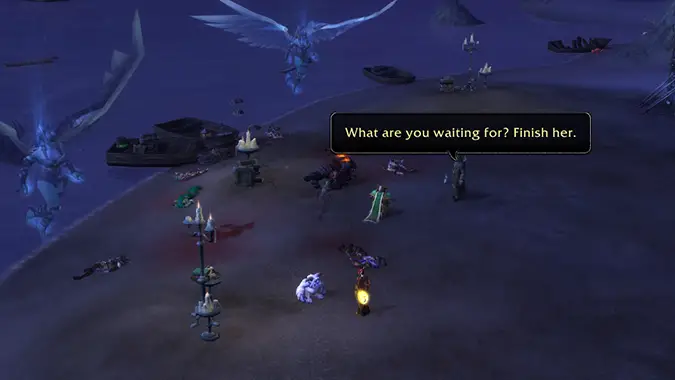
The trick of ‘choice’
It’s not even bad to be on rails — it simply means that the narrative follows a specific story line. Every single game in the Diablo series has been entirely on rails, with absolutely no character choices mattering to the overall story. Everything happens exactly as it was always going to. You are there to kill monsters and see what happens next, and that can be just fine. Final Fantasy VII, one of the most beloved JRPGs in existence? You have zero agency playing that game.
The difficulty comes in balancing the make meaningful choices ethos of many modern games with the necessity of providing a coherent, cohesive narrative that links the events so it’s not just unrelated acts of wandering murder. When an RPG can hit the sweet spot, and make your choices matter without derailing the story? It’s beautiful. When it misses the mark? It’s painful. When it makes it feel like nothing you do has any consequences? It’s devastating.
We see World of Warcraft trying ways to give players a sense of that choice while they experience — by necessity — the same story as other players, and it’s fascinating to watch. Can Sylvanas loyalists and Horde-first players be satisfied that their choices mattered when the story can only end one way?
The comments await, if you’d like to talk about times you didn’t even notice a game was on rails (Aeris!!!) or times you did and it was really, truly a problem for you.
Please consider supporting our Patreon!
Join the Discussion
Blizzard Watch is a safe space for all readers. By leaving comments on this site you agree to follow our commenting and community guidelines.
 @MatthewWRossi
@MatthewWRossi



